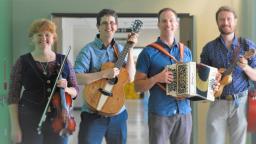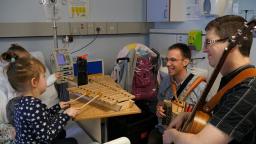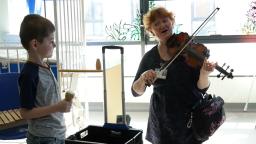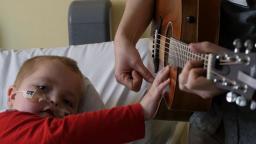
East Midlands-based arts organisation OPUS Music is one of the leading UK providers of music-making in healthcare settings. OPUS’s musicians are experts at engaging patients, visitors and hospital staff in music-making.
OPUS co-founder Nick Cutts spoke to us about how Youth Music funding has helped the organisation develop, and the impact he’s seen first-hand.
New ideas on music and healthcare
OPUS began as a community music organisation without a special focus on music and health. “I got interested in what was happening to young people in hospital, and what educational, musical and cultural opportunities were available to them,” recalls Nick. “There was very little practice of music in healthcare in the UK at the time.”
In 2009, Nick took part in a training programme led by French organisation Musique et Santé, where he explored the existing – and potential – role of music-making in hospitals around Europe.
Based on what he encountered, Nick began to develop a model which focused on giving patients ownership of the music-making process. “That fitted really well with the needs of quite vulnerable young people who are in hospital.”
OPUS’s work in practice
OPUS’s musicians work in pairs, singing and playing instruments on the wards and in communal areas of hospitals. Patients can simply listen and enjoy, or get involved with the music-making. OPUS lends them instruments including shakers, xylophones and ukuleles.
Most sessions are one-to-one, tailored to each child’s needs. OPUS’s musicians are highly responsive and encourage young people to take a lead in the music-making – whether that’s by adjusting their tempo to match the young person, playing louder or quieter, or responding musically to a baby’s verbal sounds.
“We’re always making sure we’re in sympathy with the patient and not trying to push them to go somewhere else,” says Nick.

Letting young people's voices be heard
“One young lad picked up the ukulele, and within half an hour he was playing chords and singing songs with us.
“Later we walked past his ward and he was sat teaching a doctor how to play. To see the doctor taking the time to sit there with this young patient – that says a lot about what this practice can do.
"We’re really keen on giving young people empowerment and autonomy while they’re in hospital because that’s often taken away from them. Often we find that’s what clinicians are looking for as well – getting rid of that hierarchy."
Building strong partnerships
OPUS first received Youth Music funding in 2010, and established its first programme of weekly music-making sessions at Derbyshire Children’s Hospital.
“As we built partnerships with people across the hospital and they talked to others, there was a real interest in what we were doing,” says Nick.
These connections enabled OPUS to develop partnerships with several other East Midlands hospitals over the following years, with the help of further Youth Music grants.
“We see the hospitals get huge benefits from us being there,” Nick continues. “Everywhere we go, staff say to us: ‘can you work with this patient?’, ‘it’s nice to see you’, ‘thank you for being here’.
“Music can change the atmosphere and the way people relate to each other. Rather than doctors, patients or nurses, people can just be human beings.
The funding has really enabled us to be an integral part of the team in hospital. It’s not something that happens overnight.

Training and sharing practice
OPUS also runs an apprenticeship scheme and delivers training courses for musicians and healthcare professionals. Today, OPUS is one of several organisations nationwide working in music in healthcare.
“One of our biggest roles in the last few years has been sharing practice and getting more happening,” says Nick. OPUS do this both by exchanging ideas with their fellow musicians working in healthcare settings, and by engaging directly with key people in the healthcare system.
OPUS has been central in building a network which has now evolved into the National Alliance of Musicians in Healthcare (NAMIH). In July 2017 OPUS co-hosted the first NAMIH conference – attendees included politicians, NHS representatives and arts organisations from around the UK.
Future plans
“We’re keen on supporting high-quality practice taking place elsewhere,” says Nick. “We continue to try new things out, document what we’re doing and share it with funders and partners like Youth Music and NHS England.”
“We’ll continue to contribute to NAMIH as much as we can and stimulate what it can do for the sector.
“There’s a lot more practice taking place, and more recognition from healthcare staff. People are starting to see the musician in healthcare as a profession, as opposed to just a nice thing.

Keeping the practice going, and continuing to share it as widely as we can, is critical right now. It’s an exciting time to be involved in this work.
Nick
